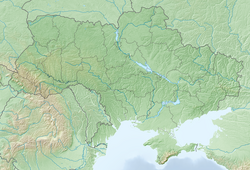Lypovets (Ukrainian: Липовець) is a small city in Vinnytsia Raion, Vinnytsia Oblast, Ukraine. Until the administrative reform of 2020, it served as the administrative center of the former Lypovets Raion. Population: 7,958 (2022 estimate).[1] It is located in the historic region of Podolia.
Lypovets
Липовець | |
|---|---|
 Lypovets skyline | |
| Coordinates: 49°13′15″N 29°03′25″E / 49.22083°N 29.05694°E | |
| Country | |
| Oblast | Vinnytsia Oblast |
| Raion | Vinnytsia Raion |
| Hromada | Lypovets urban hromada |
| Area | |
| • Total | 10.33 km2 (3.99 sq mi) |
| Elevation | 242 m (794 ft) |
| Population (2022) | |
| • Total | 7,958 |
| • Density | 770/km2 (2,000/sq mi) |
| Demonym | Lypovets' |
| Time zone | UTC+2 (EET) |
| • Summer (DST) | UTC+3 (EEST) |
| Postal code | 22500-22505 |
| Area code | +380-4358 |
History edit
Lipowiec, as it was known in Polish, was granted town rights in the early 17th century. It was a private town, administratively located in the Winnica County in the Bracław Voivodeship in the Lesser Poland Province of the Kingdom of Poland.[2] It was annexed by the Russian Empire in the Second Partition of Poland in 1793. In 1802, it became the administrative center of Lypovets uyezd in Kiev Governorate.[3] In the late 19th-century the population was mostly employed in agriculture and grain trade, which was sold mostly to Odesa.[3]
During World War II, Lypovets was the site of a battle between the Soviet Union and the Slovak State. The battle ended with a Slovak victory, with a cumulative casualty count of nearly 700. Afterwards it was occupied by Nazi German troops, from 1941, to 1944. In a field near Lypovets, from the end of April 1942, over 950 Jews were shot by German security forces with the support of local policemen and buried in two mass graves.[4] To commemorate the extermination, obelisks were erected in the 1950s - on the initiative of Leontii Usharenko, who was pulled out of the pit at the last minute and had to watch his family and acquaintances being murdered. Two memorials were erected at the mass graves of the Jewish victims in 2019 and ceremonially inaugurated in September 2019.
Population edit
Language edit
Distribution of the population by native language according to the 2001 census:[5]
| Language | Percentage |
|---|---|
| Ukrainian | 98.41% |
| Russian | 1.4% |
| other/undecided | 0.19% |
| Year | Pop. | ±% |
|---|---|---|
| 1875 | 6,710 | — |
| 1989 | 9,764 | +45.5% |
| 2013 | 8,727 | −10.6% |
| 2022 | 7,958 | −8.8% |
| Sources:[6][7][3] | ||
Gallery edit
-
Lypovets district executive committee
-
Sports ground
-
Employment centre in Lypovets
-
Palace of culture
Notable people edit
- Pyotr Stolyarsky (1871 – 1944), Soviet violinist and pedagogue
References edit
- ^ Чисельність наявного населення України на 1 січня 2022 [Number of Present Population of Ukraine, as of January 1, 2022] (PDF) (in Ukrainian and English). Kyiv: State Statistics Service of Ukraine. Archived (PDF) from the original on 4 July 2022.
- ^ Krykun, Mykola (2012). Воєводства Правобережної України у XVI-XVIII століттях: Статті і матеріали (in Ukrainian and Polish). p. 542. ISBN 978-617-607-240-9.
- ^ a b c Słownik geograficzny Królestwa Polskiego i innych krajów słowiańskich, Tom V (in Polish). Warszawa. 1884. p. 287.
{{cite book}}: CS1 maint: location missing publisher (link) - ^ Рей, Брандон. "Липовець. Життя та загибель єврейської громади" (PDF). www.holocaust.kiev.ua. Київ: УЦВІГ, 2019. Retrieved 20 October 2023.
- ^ https://socialdata.org.ua/projects/mova-2001/
- ^ Всесоюзная перепись населения 1989 г. Численность городского населения союзных республик, их территориальных единиц, городских поселений и городских районов по полу
- ^ "Чисельність наявного населення України на 1 січня 2013 року. Державна служба статистики України. Київ, 2013. стор.43" (PDF). Archived from the original (PDF) on 12 October 2013. Retrieved 3 October 2019.
External links edit
- Website «Наш Липовець»
- The murder of the Jews of Lypovets during World War II, at Yad Vashem website.


